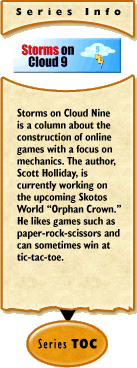 Storms on Cloud 9 #27:
Storms on Cloud 9 #27:
Tantalizing Choices
by Scott Holliday
2004-03-12
In the last column, I laid out my argument for why most online games revolve around mathematical decisions and fun with formulas. The conclusion was that the commonly understood concept of a role-playing game has superseded the actual definition. And so ... when you build an online game, it is reasonable to expect that your players will expect and desire these same mathematical options that they are used to.
So what do you do with this MMOG culture of mathematical challenges? You could follow the crowd and excel by presenting better content than your competitors. Alternately, you could try to break out of the mathematic-concept confines, and provide an innovative interpretation of how an RPG should operate. Or you could choose to take a middle road (as most do), and provide an array of challenges that are made easier by apt mathematical decisions.
I'm assuming that most of you (like myself) will opt to include at least some math and formulas as part of your gameplay. Although you may want to avoid the charts and graphs syndrome, you probably think (as I do) that a little bit of number crunching for success is fun ... or it might even fit your genre. For instance, the local games about stellar conquest or droid programming both go well with the concept of geniuses hunkered over a glowing terminal. In fact, since magic in legend and literature is often presented as an art based in study and experimentation, perhaps mathematic skill is a good way to model it.
Regardless, how do you make the choices that you present actually fun for your player?
First, you must consider how your awards affect the game. Will the characters be stronger? Will they look different? Will they be able to do new things? Typically, there are only three types of rewards:
- Increased ability: achieve better top results, get new powers, or reach new challenges
ex: new wardrobe, able to hit very skilled opponents, make higher craft items, enter zones that were previously forbidden, utilize guild level powers, now able to teleport, etc…
- Increased efficiency: able to use fewer game resources to achieve the same results
ex: need less food, use fewer magic points, equipment less likely to be damaged, may ignore taxes or travelers' fees, gain interest on money in bank, etc…
- Increased speed: able to use less real time to achieve the same results
ex: faster travel, automation of tasks and assets, bigger fuel-tank (don't need to stop as often), skills completed more quickly, heal faster, fight faster (but with same skill level), etc…
These three categories will always be the primary ways to reward your players. Yet, it is easy to see how the math fits in. By providing these three choices, you are letting the player choose based on how they want to play the game. You are actually balancing three challenges: inability, waste, and time spent.
As an example, let's assume you had a cow. Each day, you feed the cow and take care of her, and take milk to be sold. You treat her well, accumulate money and eventually you are given (or buy) a reward. What would be a good set of choices?
- More cows (increased ability -> twice the work for twice the reward)
- Super cow (increased efficiency -> requires less food or produces more milk)
- Happy cow (increased speed -> cow requires less time spent caring for it)
Notice how every choice is a true improvement? Each option presents different advantages - thus presenting the player with a quandary. Which choice is best? If you have designed well, you have balanced three factors so that each choice is equally appealing. Players will choose based on their personal desires instead of the answer given by a spreadsheet. If the game continued, perhaps additional levels of each could be made available. Ten thousand cows? Cows that grow their own food? Cows that need no care and milk themselves?
[ <— #26: Simple Arithmetic | #28: Keeping it Together —> ]

